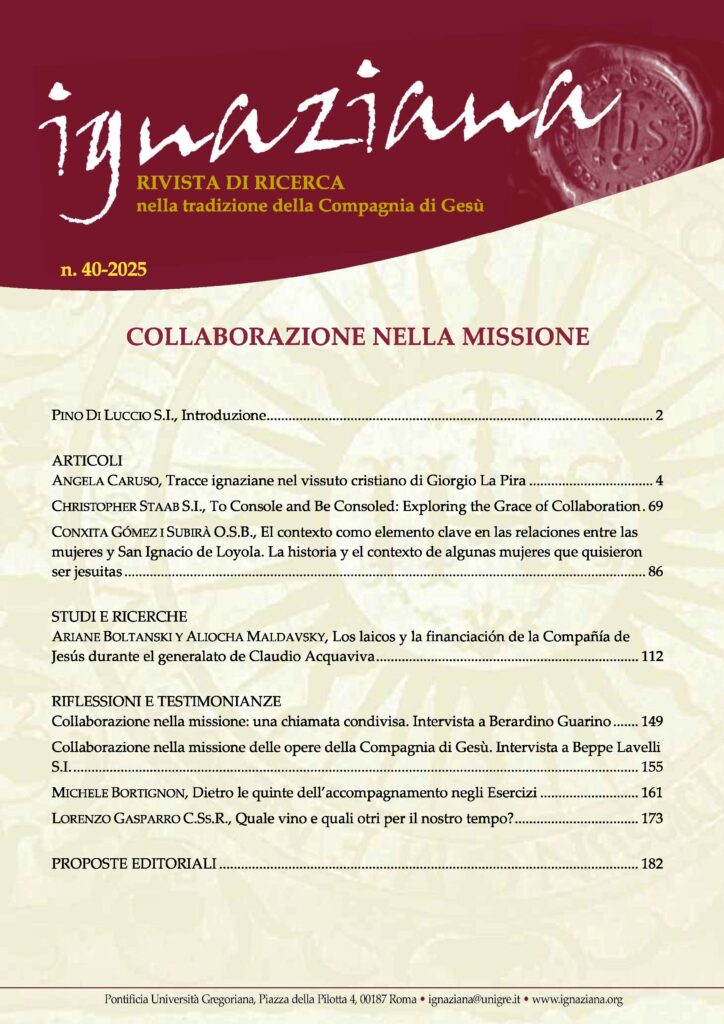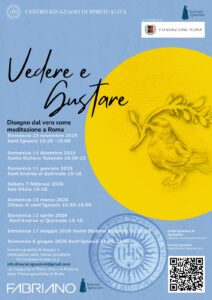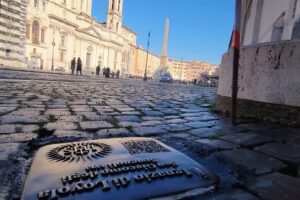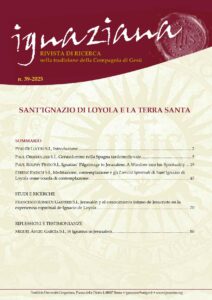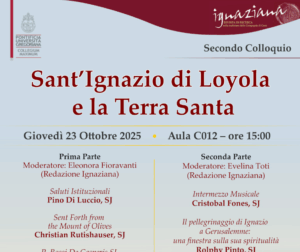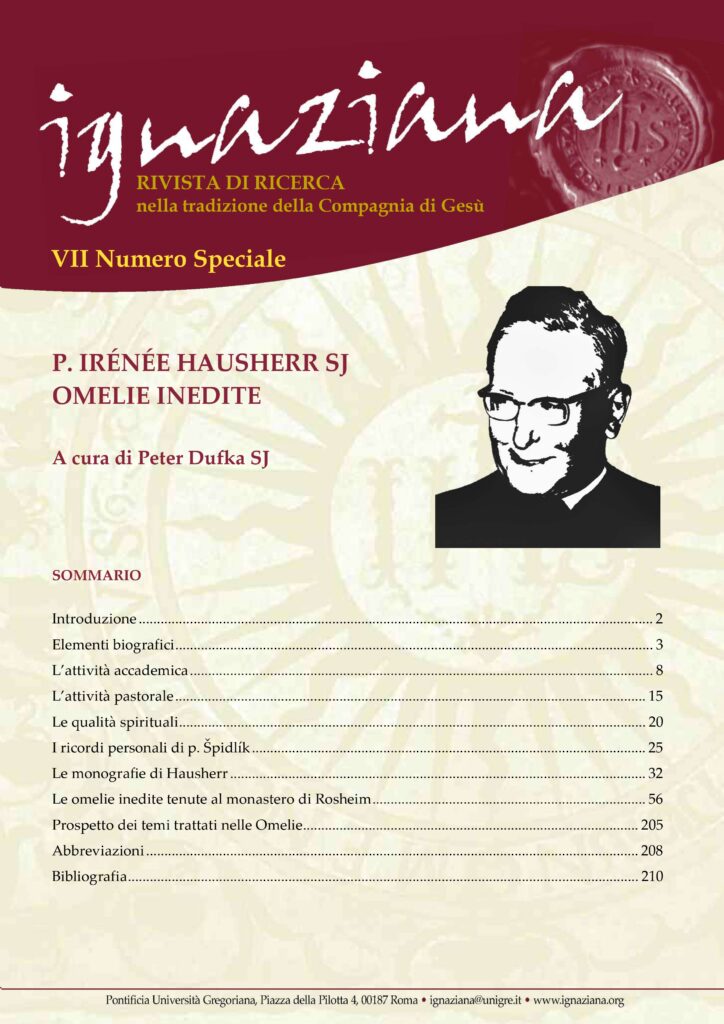di José Carlos Coupeau S.I.
Abstract
The document analyzes the relevance of spiritual discernment, particularly Ignatian discernment, in the contemporary context. The investigation begins by demonstrating that the term “discernment” has become common in various fields, including art and academic research. The research focuses on spiritual discernment and a possible specification of it, Ignatian discernment. Using F. Campagne’s theory, the meticulous analysis of academic publications and the pontifical exhortations of Pope Francis show that Ignatian discernment has not been influenced by the critical policies of the Society of Jesus. The investigation concludes that Ignatian discernment has had a significant impact on the Church and on the current factors that favor discernment.
Keywords
Discernment, Ignatian, Society of Jesus, Spiritual Exercises, Consolation.
Introduction
Let me start by stating what I am not going to do, thus averting wrong expectations. I am not going to explain discernment, either as a practice or as a theory. Space limitations do not allow for such an explanation, which would otherwise be unspecific. On the one hand, because I presuppose that each reader will approach discernment from experiences that are subjective and previous. On the other hand, because I cannot fancy myself explaining discernment in twelve pages.
The purpose of this research, instead, is to offer some evidence confirming the growing relevance of discernment. I will do so by mentioning a recent claim about the place that Ignatian discernment occupies in history. This claim affirms that, beginning with Ignatius of Loyola, the Society of Jesus contributed to the “clericalization of discernment”, subjecting discernment to the rigid control of the ecclesial institution. I will assume a critical stand in the face of this claim. I will analyze sources that are academic and independent of the Society of Jesus, thus purposedly avoiding the often-used references to Jesuit sources specialized in discernment, be them pastoral or internal sources. Finally, I will choose some approaches to Ignatian discernment: a) at the level of Ignatian scholars; b) at the international level; c) at the academic level of research, where I will consider a discrete period of time (2010-2020).
Conceptualization
Discernment is in vogue. If not discernment, at least the concept of discernment, seems rather present in secularized culture, if compared with post-Vatican Council II ecclesiastical discourse.
We recently found, for example, that an online gallery meant to promote and sale art (Artmajeur) labeled a number of paintings and artworks as discernment. Discernement is the label helping visitors to locate more than 31 works in Artmajeur catalog. Two examples that may stimulate the approach of those interested in discernment are those by Flavien Couche and Gilles Clement Eugene.[2]
Surprisingly, discernment has gain greater relevance in the university arena in the last ten years here studied. As a sample button, “discern” and “discernment” are terms found across the abstracts of 97 doctoral dissertations defended in Spanish universities between 2020 and the beginning of May 2022. Their research spanned over departments as far apart as law,[3] legal sciences and philosophy,[4] economic theory and industrial organization,[5] mathematics and digital languages,[6] or literary criticism (in order of publication).[7]
Spiritual discernment. Giving one more step and now moving closer to the Ignatian context, spiritual discernment used to be an ascetic practice with an already secular history. This history was summarized by the Dictionnaire de Spiritualité, in a dense article running through seventy columns.[8] This article appeared in 1957 and benefited much from research carried out by Christus, a recently created Ignatian review.[9] That rather complex entry in the Dictionnaire informs us about the relevance that the discernment topic was gaining in the decade before the Vatican Council II. It also informs us of the felt need to offer an overview on spiritual discernment by the late 1950s, which help me introduce the third step of this introduction.
Ignatian Discernment
Since the publication of that entry in the Dictionnaire, Ignatian discernment has grown popular, at least as a notion. Curiously, we do not find the “Ignatian discernment” term as such along the Ignatian sources. It is worth noting here, thus, a certain confusion between the invention of Ignatian discernment and its consequent application. “Ignatian discernment” is not an expression originating with Ignatius of Loyola, as “consolation” or “Principle and Foundation” are. However, it today serves the Ignatian community to refer to a way of understanding discernment. “Ignatian discernment” is an object easily observable in written sources. Less reliably recorded and therefore more difficult to study, however, is the practice of discernment.
Viljem Lovse devoted his research to discovering the mark that the tradition on discernment had left on the various Ignatian texts. He compared the Spiritual Exercises, the Constitutions and the Letters and Instructions with the Christian tradition on discernment. Lovse identified aspects of continuity between Ignatius’ use of discernment and the tradition Ignatius could count on in Sixteenth century Europe. Lovse showed the genuine Ignatian contribution to the tradition he inherited. On the one hand, Ignatius “took up and reshaped” the discernment of spirits he received from Origins and Evagrius, for example, as a matrix out of which Christians could take their personal spiritual choices. On the other hand, Ignatius wrote discretion and discreet charity as terms relating to the subjective content of discernment (the motions) as prompted in the face of objective predicaments and in the context of very concrete circumstances. That is, not just in relation to one’s own spiritual choices, but in relation to governance and apostolic policies and missions of others.
Lovse concluded that Ignatius exhorted discreet charity (or decision-making presided over by charity and discretion) and so wrote it. And yet, today we usually speak of discernment. Ignatius wrote discretion of spirits, but today we speak of spiritual discernment. Ignatius together with his first companions engaged in consultation processes and wrote deliberations, but today we insist on speaking of communal discernment (and more recently we can speak of “synodality”).[10]
To summarize it all, and with the help of Illustration 1, we understand Ignatian discernment today as a set of realities. All of them originate from the Ignatian writings and practices. In fact, the Ignatian term deliberation –referred to as communal discernment today- allows us to speak of a synodal sphere of practice known as Ignatian discernment. Likewise, we may speak of discreet charity as that sort of discernment in general, which concerns discernable things; that sort of discernment in which charity brings discretion to terms with concrete action, such as choosing or deciding. At the heart of discernment practice and theory, we locate consolation, that positive movement, which Ignatius defines in the Rules of Discretion of Spirits. Consolation is one among several other motions. Arguably it is the most frequent. Certainly, it is one of the most valuable daily experiences. Motions are the object of study of the discretion of spirits, (today referred to as Ignatian spiritual discernment). To conclude, Ignatian discernment, which opens to every individual practice of spiritual discernment, may not be limited to it.
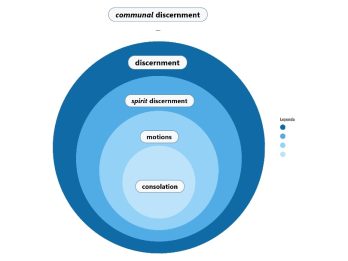 As spirit discretion is being recovered, some historical analysis of the written sources helps us to take another step forward. Discretion of spirits attracted late medieval history scholars’ attention.[11] Beginning the second decade of this century, Clare Copeland and Jan Machielsen edited the proceedings of the 2011 Oxford conference on this topic, under the title Angels of light? The conference attracted both historians and theologians, Catholics, and Protestants.[12]
As spirit discretion is being recovered, some historical analysis of the written sources helps us to take another step forward. Discretion of spirits attracted late medieval history scholars’ attention.[11] Beginning the second decade of this century, Clare Copeland and Jan Machielsen edited the proceedings of the 2011 Oxford conference on this topic, under the title Angels of light? The conference attracted both historians and theologians, Catholics, and Protestants.[12]
While Campagne’s work highlights the importance given to that Ignatian doctrine, we believe that it does not document it sufficiently. In fact, it does not demonstrate these assertions for a specific lapse of time nor geographical area. From our present situation and perspective, it is not absurd to suppose such an evolution or impact. However, the official documents of the Society of Jesus provided by the research prove the institutional directives rather than the actual implementation or any ways in which it was carried out. It remains a hypothesis that, through the ministry of spiritual direction and the theological services offered by the Jesuits, an “anti-mystical svolta was carried out.”
Given the fact that Campagne’s work does not prove the existence of a school of discernment, this research presents two types of evidence: on the one hand, the presence of discernment in the written magisterium of Pope Francis (himself a Jesuit) and its impact on the documentation of the Spanish Bishops Conference; on the other hand, a series of publications unrelated to the Society of Jesus, which we will compare with internal Jesuit publications on discernment. Both types of evidence argue in favor of the same idea: the growing impact of Ignatian discernment inside and outside ecclesiastical circles.
Method and bibliographic analysis
In order to present evidence that can partially verify Campagne’s assertion for the 21st century, the following pages give an account of a method that, taking 2010-2022 as the period of study, 1) carries out an analysis of publications accredited as impact research, and 2) compares them with a universe of other publications associated with Ignatian discernment and 3) further analyzes the text of the pontifical exhortations of Francis, 4) comparing them with the contemporary Plenary Sessions documents issued by the Spanish episcopate. For space limitations, I will present points 3) and 4), dispensing with arguments and notes, making use of synthetic tables, and coming to some summary conclusions.
Starting point
Ignatian discernment has become a very popular aspect of Ignatian Spirituality indeed. To get a glimpse at the recent history of publications on Ignatian discernment, we have the Guide for Researchers.[15] The Guide acknowledged a rise of interest in discernment twelve years ago.[16] The Guide identified more than a hundred and a half bibliographical entries dedicated to it in Ignatian publications (at least 168 titles, since year 2000). Since 2010, however, the number of publications continues to grow (reaching almost three hundred titles at the beginning of 2022). Many of the nearly 273 bibliographical entries related to Ignatian discernment include the word “discernment” in the title. Some use the word in the brief presentation of the publication. A first analysis of the whole reflects an enormous diversity of approaches to our topic.
In view of this finding, I will offer a selection of scientific publications in academic journals of impact. A research team from the Faculty of Engineering of the University of Deusto, under the direction of Igone Porto, identified these publications in the multidisciplinary database Web of Science (abbreviated WoS), according to a systematic search for “Ignatian” in a spectrum of documentation.[17] By combining four search terms (“Ignatius”, “Ignatian”, “Society of Jesus”, “Jesuits”), 3,235 titles were identified. 923 publications were analyzed with the help of artificial intelligence. The English term “discernment” appears in the title of 19 of these publications. “Discernment” constitutes a keyword in 14 publications and is found in the abstract of 25. Illustration 2 shows the outcome of comparing the three lists.
|
Authors |
Title of the article / chapter |
Sources |
ISSN |
Year |
|---|---|---|---|---|
|
Trinidad, J.E. |
Dialogue, discernment, and creative tensions in Jesuit higher education |
International Studies in Catholic Education |
1942-2539 |
2021 |
|
Gomez-Sevilla, H. Florez, H. |
Network innovation: experience in motion in the network of Jesuit schools in Colombia |
International Studies in Catholic Education |
1942-2539 |
2021 |
|
Plante, T.G. |
Using the Examen, a Jesuit Prayer, in Spiritually Integrated and Secular Psychotherapy |
Pastoral Psychology |
1573-6679 |
2021 |
|
Campanario, S.C. Bikos, L.H. Kendall, D.L. |
Ignatian Spirituality and Career Development: New Evidence for Age-Old Practices |
Journal of Career Development |
0894-8453 |
2020 |
|
Haers, J. |
A Synodal Process on Synodality: Synodal Missionary Journeying and Common Apostolic Discernment |
Louvain Studies |
0024-6964 |
2020 |
|
Clarence, M. Viju, P.D. George, T.S. |
The Jesuit educational mission in rural Chotanagpur, India: historical achievements and contemporary challenges |
International Studies in Catholic Education |
1942-2547 |
2019 |
|
Kwon, Y.D. |
Chinul’s Empty and Quiescent Spiritual Knowing (kongjok yongji) and Ignatius of Loyola’s Indifference and Discernment of Spirits |
Journal of Korean Religions |
2093-7288 |
2019 |
|
Rixon, G.A. |
Dwelling on the Way: Pope Francis and Bernard Lonergan on Discernment |
Irish Theological Quarterly |
0021-1400 |
2019 |
|
Soltes, R. |
The Influence of Emotions on Spiritual Life in the Discernment of Saint Ignatius of Loyola and Saint John of the Cross |
Spirituality Studies |
1339-9578 |
2019 |
|
Coleman, C.D. |
What Hath Loyola to do with Azusa Street? Ignatian Themes in Amos Yong’s Theology of World Religions |
Journal of Pentecostal Theology |
0966-7369 |
2018 |
|
Imanaka, J.L. |
Laudato Si’, Technologies of Power and Environmental Injustice: Toward an Eco-Politics Guided by Contemplation |
Journal of Agricultural & Environmental Ethics |
1187-7863 |
2018 |
|
Plante, T.G. |
The 4 D’s: Using Ignatian Spirituality in Secular Psychotherapy and Beyond |
Spirituality in Clinical Practice |
2326-4519 |
2017 |
|
Prevot, A |
Ignatian Spirituality, Political Effectiveness, and Spiritual Discernment: Dean Brackley’s Account of Liberation Theology |
Political Theology |
1462-317X |
2017 |
|
Rothausen, T.J. |
Integrating Leadership Development with Ignatian Spirituality: A Model for Designing a Spiritual Leader Development Practice. |
Journal of Business Ethics |
0167-4544 |
2017 |
|
Tran, D.Q. Carey, M.R. |
Mercy within Mercy: The Heart of Pope Francis’ Inclusive Leadership in a Broken World |
Breaking the Zero-sum Game: Transforming Societies Through Inclusive Leadership |
178743186X (ISBN-10) |
2017 |
|
Austin, N. |
Spirituality and Virtue in Christian Formation: A Conversation between Thomistic and Ignatian Traditions. |
New Blackfriars |
0028-4289 |
2016 |
|
Lavallee, M.H. |
Practical Theology from the Perspective of Catholic Spirituality: A Hermeneutic of Discernment |
International Journal of Practical Theology |
1430-6921 |
2016 |
|
O’Brien, T.W. |
‘Con ojos interiores‘ Ignatius of Loyola and the Spiritual Senses |
Studies in Spirituality |
0926-6453 |
2016 |
|
McChlery, L. |
How Might the Theory and Practice of Ignatian Spirituality Inform Vocational Discernment in the Church of Scotland? |
Practical Theology |
1756-073X |
2015 |
|
Prosperi, A. |
The Two Standards The Origins and Development of a Celebrated Ignatian Meditation |
Journal of Jesuit Studies |
2214-1324 |
2015 |
|
Delclos, V.R. Donaldson, R.P. |
Contemporary liberal education: slowing down to discern |
On the Horizon |
1074-8121 |
2014 |
|
Henold, M.J. |
Consciousness-Raising as Discernment Using Jesuit and Feminist Pedagogies in a Protestant Classroom |
Jesuit and Feminist Education: Intersections in Teaching and Learning for the Twenty-First Century. |
|
2012 |
|
Rakoczy, S. |
Living Life to the Full: The Spirit and Eco-feminist Spirituality |
Scriptura-International Journal of Bible, Religion, and the Theology in Southern Africa |
0254-1807 |
2012 |
|
Frick, E. |
Pastoral and Psychotherapeutic Counseling |
Christian Bioethics |
1380-3603 |
2010 |
Illustration 2
These publications contrast with those tracked down in journals specializing in Ignatian spirituality, their contemporaries. Points of contrast characteristic of Illustration 2 include not only diffusion through academic databases and scientific networks, but also the scientific level, the nature of the publications and the areas of knowledge to which they belong. Illustration 2 shows authors, disciplines and journals that cannot be identified as Jesuits (but for a couple of them), Jesuitical, subject to Jesuit ideology or institutionalizing agents of “discernment”. They originate from the academic world and belong to disciplines such as History and History of Religions, Pastoral Psychology and Clinical Practice, Education or Business Ethics, and even (non-Catholic) Theology. Briefly put, except for a couple, they have not been written by Jesuits or for Jesuit ends (see Illustration 3).
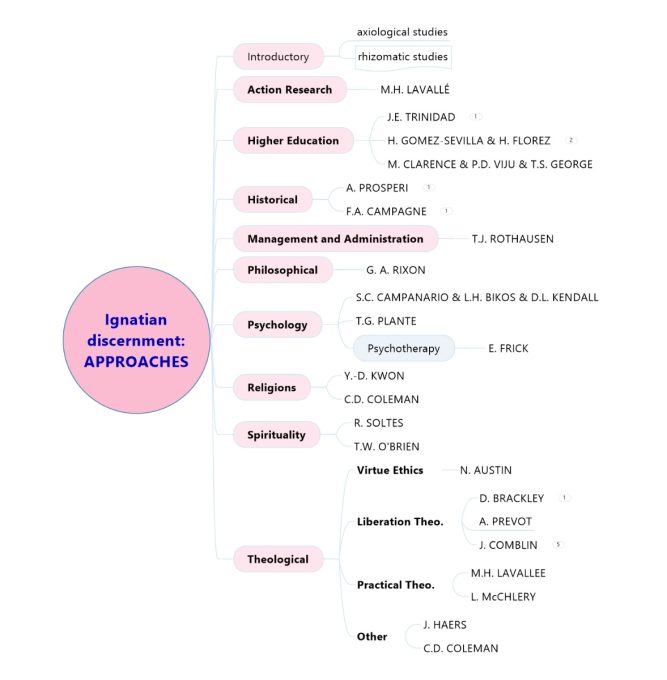
Illustration 3
Pope Francis’ exhortations
Having offered some evidence that Ignatian discernment need not be exclusively Jesuit, or the consequence of Jesuit Generals instructing their subjects to institutionalized it one way or another, next I want to provide an example of one Jesuit bearing on the way discernment is promoted. Among the many instances where we could investigate the impact of Ignatian discernment, the papacy of Francis has become a “commonplace”. It is already commonly agreed that Pope Francis thought on discernment springs from his Ignatian background and experience of the Spiritual Exercises. Francis, however, has made this word a key word of his pontificate in rather open terms. By giving discernment a prominent place in his magisterium, Francis renders discernment an operative ecclesial reality.
In fact, all five of his apostolic exhortations refer to discernment (Illustration 4). Three of them, moreover, dedicate some substantial section to it.[18] Altogether, these exhortations give a broad vision of discernment. That is, they use no restrictive understanding of “discernment”, but describe it as a privileged way of Christian life. Illustration 4 presents synthetically the frequent use of the noun but also of the verb in these exhortations. References are relevant to pastoral discernment as well as to personal discernment, to evangelical discernment as well as to special discernment, to practical discernment, to vocational discernment or, well, to fundamental discernment. Surely enough, they contemplate spiritual discernment as well.
|
|
Apostolic Exhortations of Pope Francis |
||||
|
Voices referred to |
Evangelii Gaudium (2013) |
Amoris Laetitia (2016) |
Gaudete et exsultate (2018) |
Christus vivit (2019) |
Dear Amazon (2020) |
|
discernment (noun forms) |
9 |
35 |
17 |
23 |
1 |
|
to discern (verb forms) |
5 |
10 |
5 |
9 |
0 |
Illustration 4
In this context, we look for discernment in the following documents of the Spanish Bishops Conference. The use and frequency with which the exhortations make various applications of discernment relevant invite comparison with the use and frequency of discernment in the documents of the Spanish Episcopal Conference (CEE), to prove the reception or impact of those. We look at the final documents issued by the Plenary Assemblies (henceforth, PPAA) of the CEE. Analysis discovered that at the beginning of Francis’ pontificate, the plenary assemblies rarely used the term. After Cardinal Omella’s inaugural speech at the Plenary Assembly (PA) held in April 4, 2021, however, the term bursts with force (45 times). Cardinal Omella went so far as to affirm that “pastoral conversion, discernment and synodality are the three main axes that, in harmony with Pope Francis and with the universal Church, structure and motivate these lines of action”. (Communiqué of the PA117).
Plenary Assemblies
The Plenary Assemblies of the Spanish Bishops Conference (PPAA) referred to discernment nowhere before 2014. References to discernment from then on were far from being imbued with the sense we have seen up to this point be it in the academic publications or in the pontifical exhortations. For example, the communiqué of November 21, 2014 states, “we can say that the background of the children who approach catechesis is very varied, making personal discernment and accompaniment necessary.” Likewise, PA107 stated: “with a permanent spirit of service, we have had to carry out as pastors a discernment of the moral situation of our nation and its institutions”. The moral notion of discernment in 2014 -as a token- represents an epochal piece. The paragraph informed the faithful of the procedure by which the CEE had been pondering the kind of presence that the Spanish Church was to choose in the context of national institutions. The Spanish society undergoing a deep social transformation, the CEE assumed a moralizing, rather than spiritual stand. It showed its concern for the “moral situation” of the country in general. It described its attitude of dialogue with the political community and cultural groups representing different ideologies.
Two years later, however, José San José Prisco closed the Congress on Episcopal Conferences: Origins, Present and Prospects with a paper entitled “Episcopal Conferences in a Synodal Church”. St. José Prisco emphasized discernment as a form of government, that is spiritual. His speech, moving away from the forms of discernment already seen for 2014, represents a maximum approach to synodality in particular and to the notion of discernment present in the exhortations in general.
This relative dearth of references to discernment is amply confirmed by the documentary base of the CEE. As of winter 2017, some secondary documents allude to discernment… in vocational terms only. Sporadic references either in the Decree of confirmation of the “Missionaries of Mercy”, or in texts concerning the convocation or the conclusions of the Synod “Young people, faith and vocational discernment”, are swallows that do not make springs. The PPAA needed six more years, before they returned to discernment in Faithful to Missionary Sending (2021). Very likely as a result of the synodality process during the winter of 2022, the vocabulary of discernment was now going to spread through the documentation in a remarkable way. The Department of Penitentiary Pastoral Care, the Episcopal Subcommission for Migration and Human Mobility, and even the Episcopal Commission for the Doctrine of the Faith alluded to discernment in its For freedom Christ has set us free (March 2022). The Information Office in its note on the press release issued by the XV Ordinary Council of the Synod of Bishops (January 26, 2022) broadens the horizons with these words: “The real challenge of synodality is precisely mutual listening and communitarian discernment”. Beyond the discernment of anyone’s vocation or the moral discernment between good and evil, discernment appeared both as a disposition and as a methodology that seeks cooperation with the Holy Spirit.
|
Date |
Document title which refers to discernment |
Department |
|---|---|---|
|
2022.03.25 |
Christ has set us free for freedom |
Commission for the Doctrine of the Faith |
|
2021.12.14 |
Unaccompanied migrant children and youth |
Episcopal Subcommission for Migration and Mobility |
|
2021.11.25 |
Synodality: a Prison Ministry standpoint |
Department of Prison Pastoral Care, |
|
2021.04.04 |
Faithful to missionary sending |
PLENARY ASSEMBLY 117 |
|
2020.02.16 |
Laity: “It is our time and we are the chosen ones”. |
Information Office |
|
2019.11.22 |
Together on the way: Itinerary of formation and accompaniment of engaged couples |
Information Office |
|
2019.08.28 |
“My soul thirsts for God, for the living God” (Ps 42:3). Doctrinal orientations on prayer |
Commission for the Doctrine of the Faith |
|
2018.01.25 |
Youth Pastoral organizes a seminar with young people in Valladolid on discernment |
Youth Pastoral Department |
|
2017.12.12 |
Report of the Synthesis for the Synod … “Young people, faith and vocational discernment”. |
Since 2017.03.17, several other documents include this term only as a reference to the preparation/conclusions of the Synod noted. |
|
2017.10.10 |
54 Spanish priests renewed as “Missionaries of Mercy”. |
Information Office
|
|
2016.04.22 |
At the service of the Church and our people. Message on the occasion of the 50th anniversary of the Spanish Episcopal Conference. |
PLENARY ASSEMBLY 107
|
|
2014.11.21 |
To guard, nourish and promote the memory of Jesus Christ. Pastoral Instruction on Catechisms |
PLENARY ASSEMBLY 104
|
Illustration 5
Conclusions: a broad spectrum of approaches to discernment
Coming now to the results of this research, discernment in general has grown important as a theme. Ad intra of the Church, the study of the allusions to “discernment” reveals an evolution in the number and nature of the references that the CEE made to discernment, especially in its PPAA between 2010-2022. Next, a like study of references to discernment now in the CEE documentary base (1966-2022) confirms such evolution and development by the number and nature of these references. Ad extra and from various fields of knowledge, instead, we discover occurrences of the concept, of the process/praxis or of the application of discernment in various areas of reality.
Since the birth and development of the expression “Ignatian spirituality,” the topic of Ignatian discernment never generated so much interest if we consider publications. Now, to the question of whether this interest represents a “clericalization of discernment” or some sort of its institutionalization, the data do not prove Campagne’s hypothesis, at least for the last few years. It begs the question, instead, whether it can be maintained from our situation: How and when that situation could have been overturned then.
The widespread interest in Ignatian spirituality has favored both the return to the sources and the recovery of various practices associated with discernment, such as spiritual discernment, community discernment or spiritual conversation. Associated with the Exercises and their practice, associated with Ignatian government and its principles, discernment was preserved and transmitted through time, as something rare and precious, the realm of spiritual seekers.
Ignatian discernment is rooted in Pauline and in evangelical discernment. It has since been associated with the ascetical tradition. Amongst the various treads and components of that tradition, however, discernment has come down to us in rather better shape than other ascetical practices, for example the penitential ones. Discernment expresses itself in new and creative ways. Illustration 4 only exemplifies some of these applications, other than those merely focusing on St. Ignatius, his works or doctrine. With Illustration 4 I wanted to give a synthetic account of them.
Can we speak today of disciplining, institutionalizing or clericalizing discernment? The evidence gathered here seems to advise against it. On the other hand, we note both a growing interest and a growing liberation of discernment, which seems to be leaving the ecclesiastical sphere. Discernment is opening to other fields of praxis and knowledge (no longer philosophical or theological); it is opening up to other Christian churches and is reaching out to other latitudes, in fact, going beyond the Mediterranean and even European scenario. Moreover, authors are no longer the Jesuits, but lay people. We note that the proportion of female authors in relation to the number of male authors is higher there than in the Spanish specialized pastoral and spiritual journals of the Society of Jesus, such as Sal Terrae or Manresa (compare Illustration 2 with Bibliography below), where the authors are mostly men. Lastly, no one less suspected of clericalization than Pope Francis. We believe we have given an example of the impact of his magisterium on the popularization of discernment, starting from its Ignatian matrix.
Bibliography
Aleixandre Parra, Dolores. “Las reglas del discernimiento. Variaciones sobre un tema Ignaciano.” Sal terrae 100, no. 1167 (2012): 423-434.
Cabria Ortega, José Luis. “Criterios y actitudes para una verdadera reforma en y de la Iglesia.” Sal terrae 106, no. 1233 (2018): 397-414.
Catalá, Toni y Ignacio Boné Pina. “Disposiciones personales ante el discernimiento comunitario.” Manresa 90, no. 354 (2018): 49-62.
Dardis, John. “Discernimiento en común: Una novedad basada en una tradición antigua.” Manresa 90, no. 354 (2018): 5-16.
De la Torre Díaz, Francisco Javier. “Creciendo en conocimiento y todo discernimiento. Retos en la misión compartida.” Sal terrae 99, no. 1157 (2011): 495-508.
García Domínguez, Luis María. “Discernir la desolación.” Manresa 91, no. 358 (2019): 93-96.
________. “Discernir y acompañar escrúpulos.” Manresa 91, no. 360 (2019): 285-288.
________. “Qué es y qué no es acompañamiento espiritual.” Sal terrae 105, no. 1227 (2017): 865-877.
García Rodríguez, José Antonio. “Discernimiento y misión en la vida religiosa activa.” Sal terrae 100, no. 1167 (2012): 435-445.
González-Carvajal Santabárbara, Luis. “Signos de los tiempos y discernimiento.” Sal terrae 100, no. 1167 (2012): 409-421.
Guerrero, Pablo. “De considerar categorías abstractas a escuchar a personas concretas. El acceso a los sacramentos de los católicos divorciados vueltos a casar.” Sal terrae 105, no. 1222 (2017): 451-466.
Janin, Franck y José de Pablo. “Ejercicios Espirituales adaptados al discernimiento en común.” Manresa 90, no. 354 (2018): 63-72.
Jiménez, Cristóbal. “El discernimiento apostólico en común. Entrevesta a José A. Garcia.” Manresa 90, no. 354 (2018): 27-38.
Labrador, Jesús y José Carlos Romero. “Discernimiento ignaciano, diversidad e inteligencia cultural.” Manresa 88, no. 349 (2016): 373-384.
Massé, María del Carmen. “Discernir el amor y la sexualidad.” Sal terrae 106, no. 1235 (2018): 575-588.
Mollá Llácer, Darío. “Acompañar en el sufrimiento.” Sal terrae 105, no. 1227 (2017): 895-906.
Ordóñez, Antonio. “La pedagogía y el discernimiento: esbozo de un manual de intuiciones.” Manresa 91, no. 358 (2019): 77-88.
Puiggròs Llavinés, Enric. “Apropiarse de la vida. Acompañamiento ignaciano y discernimiento vocacional.” Manresa 90, no. 357 (2018): 347-358.
Rodríguez Osorio, Hermann. “Discernimiento Espiritual Comunitario: Novedades y tradiciones.” Manresa 90, no. 354 (2018): 39-48.
Rodríguez Panizo, Pedro. “La formación teológica de los presbíteros.” Sal terrae 106, no. 1236 (2018): 687-698.
Ruiz Pérez, Francisco José. “La Congregación General 36 y su invitación al discernimiento en común.” Manresa 90, no. 354 (2018): 17-26.
________. “Misión versus tareas. Algo más que un dilema funcional para la vida religiosa.” Sal terrae 107, no. 1246 (2019): 613-626.
________. “Una propuesta de pautas para el discernimiento.” Manresa 89, no. 352 (2017): 275-288.
Sicre, Emmanuel. “Memoria y lenguaje: núcleos irrenunciables de la pastoral con jóvenes.” Sal terrae 106, no. 1233 (2018): 447-458.
Toraño Fernández, Abel. “Realizar la propia vida. Seguir la vocación.” Sal terrae 106, no. 1236 (2018): 725-737.
Valero, Urbano. “Discernir para decidir en la Vida Religiosa.” Sal terrae 98, no. 1146 (2010): 519-530.
Valls, Marte. “El acompañamiento pastoral de la vocación.” Sal terrae 107, no. 1242 (2019): 217-230.
Contributo originariamente pubblicato in lingua Spagnola: Jose C. Coupeau, “El discernimiento ignaciano,” in San Ignacio de Loyola: el hombre, el santo, el general. Actas del Congreso Internacional sobre San Ignacio de Loyola (Córdoba: Almuzara, 202), 131-149. ↑
Other authors are: Corinne Brossier, Magali Augris, Eric Leroy or Sarah Leseigneur. ↑
1. Oliver Pascual Suaña, “Defensa de las personas jurídicas en el proceso penal español,” PhD diss. (Universidad de Valladolid, 2022). ↑
José Francisco Gómez Rincón, “Hegemonía cultural, estrategia populista y crisis. La construcción del discurso político de Podemos,” PhD diss. (Universitat de València, 2022). ↑
Irma Alonso, “The macro financial transmission of shocks,” PhD diss. (Universidad Carlos III, 2022). ↑
Ana Paula de Oliveira, “Proposition d’intégration des outils de tal pour une classe de fle, à travers le cas complexe du corpus d’archives de la presse de la première guerre mondiale,” PhD diss. (Universidad de Salamanca, 2021). ↑
Aurora Murga Aroca, “An ecocritical approach to the Gothic supernatural hybrid in the fin de siècle,” PhD diss. (Universidad Complutense de Madrid, 2021). ↑
Dictionnaire de Spiritualité, s.v. “Discernement des Esprits,” 3, 1222-1291. ↑
Christus first volume (1954) devoted an entire dossier to spiritual discernment. John W. O’Malley and Timothy O’Brien. “The Twentieth-Century construction of Ignatian spirituality: A sketch.” Studies in the Spirituality of Jesuits 52, no. 3 (2020), 21-22, no. 34 and the translator’s commentary in Id., “La construcción de la espiritualidad ignaciana en el siglo XX: un esbozo.” Ignaziana, no. 30 (2020), 288-289. ↑
Viljem Lovse, “Conversar para discernir y deliberar: Estudio de la concepción ignaciana del discernimiento,” in Instituto de Espiritualidad (Madrid: Universidad Pontificia de Comillas, 2002), 631. ↑
Among other authors, the following stand out for their doctoral research: Nancy Caciola, “Discerning spirits: sanctity and possession in the later middle ages” (Ann Arbor, Michigan: UMI, 1998) and, later, Id. Discerning spirits: divine and demonic possession in the Middle Ages (Ithaca, N.Y.: Cornell University Press, 2003), as well as Cornelius Roth, “Discretio spirituum: Kriterien geistlicher Unterscheidung bei Johannes Gerson,” in Collection Studien zur systematischen und spirituellen theologie (Würzburg: Echter, 2001) and, later, Spiritualität in der Seelsorge Spirituelle Theologie, ed. C. Roth (Würzburg: Echter Verlag, 2011) (online format) and C. Roth. “Irrtum und Wahrheit – Die Auseinandersetzung Johannes Gersons mit wahren und falschen Visionen und Lehren. Versuch einer Kriteriologie,” in Irrtum – Error – Erreur, edited by Andreas Speer and Maxime Mauriège (Berlin; Boston: De Gruyter, 2018), 627-636. ↑
Clare Copeland and Johannes Machielsen, eds. “Angels of light? Sanctity and the discernment of spirits in the early modern period” in Studies in Medieval and Reformation Traditions (Boston, MA: Brill, 2012). ↑
Fabián Alejandro Campagne, “Ignacio de Loyola, Gersonian spirituum discretor. La Compañía de Jesús y el fenómeno místico-profético en la primera Edad Moderna,” in Profetas en ninguna tierra. Una historia de discernimiento de espíritus en Occidente, ed. Fabián Alejandro Campagne (Buenos Aires: Prometeo, 2016), 235-254. ↑
Fabián Alejandro Campagne, “Ignacio de Loyola y Teresa de Ávila. Inspectores de espíritus : Institución y Carisma en los albores de la Era confesional.” Via Spiritus : Revista de História da Espiritualidade e do Sentimento Religioso, no. 21 (2014), 102-103. ↑
Jose C. Coupeau, “Espiritualidad Ignaciana: Guía Para Investigadores,” in Ignaziana no. 8 (2009), 73-129; although the term recurs some 70 times throughout the article, see especially 117-119. ↑
For the years 2010, 2011, 2012, and 2013, please see the corresponding section on the Ignaziana website, under the “bibliographies” tab (https://ignaziana.org/en/editorial/bibliography/). ↑
Igone Porto Gómez, et alia, “Ignatius: ‘El primer preámbulo es la historia’,” in Transformación y Espiritualidad. Miradas para un mundo en crisis, eds. José Á. Achón Insausti, et alia (Barcelona: Herder – Universidad de Deusto, 2022), 335-359. ↑
Amoris Laetitia (AL) “Accompanying, discerning, and integrating weakness” (chapter 8); Gaudete et Exsultate (GE), “Spiritual Combat, Vigilance and Discernment” (chapter 5); Christus vivit (CV) “Discernment” (chapter 9). ↑
